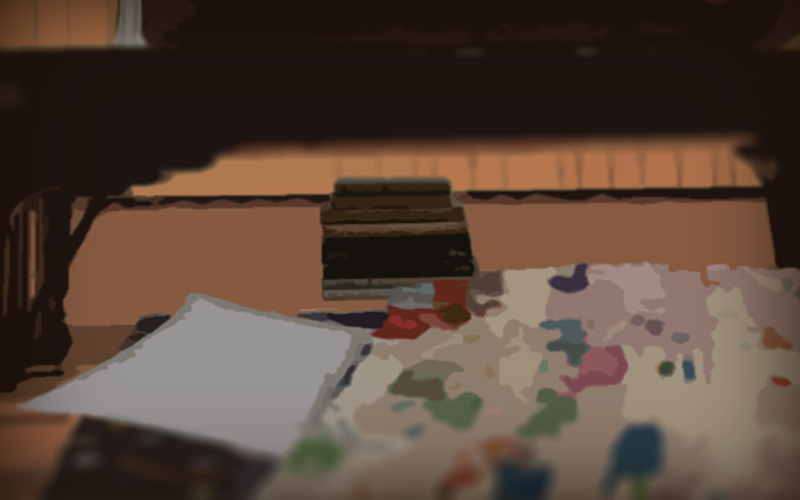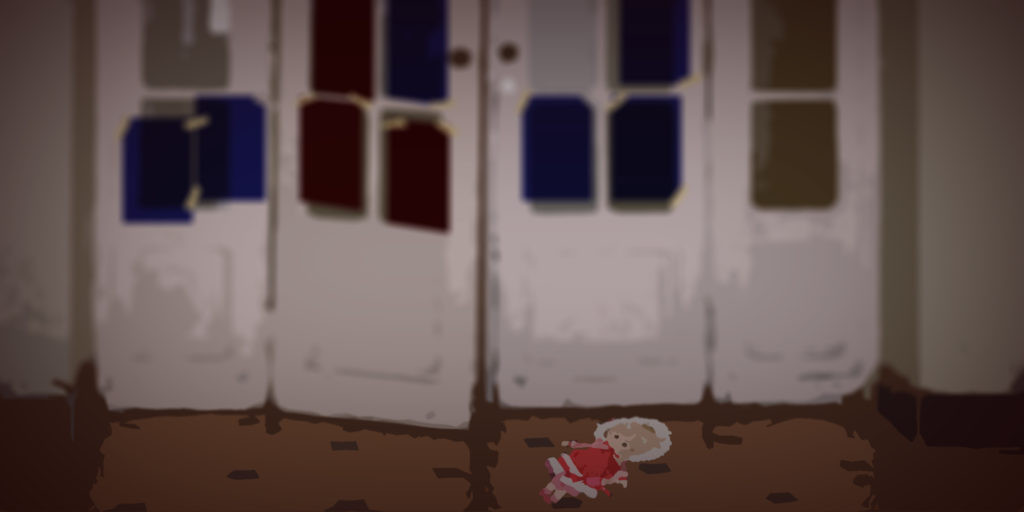“There’ll be bluebirds over the white cliffs of Dover tomorrow, just you wait and see.” It is 1944, I am seven-years-old, and I want these words to be true.
Last night, there was an air raid, and I was sure this time it was the real thing. I shivered under the covers, waiting to die. When the all-clear sounded, I said to my dolls, “See, I told you it was going to be fine.”
It’s Sunday morning, I am in my parents’ bed. I smell coffee, cinnamon rolls, and hear laughter, a whirling fan. I am tickled and kissed, nestled in a white featherbed. An amber Bakelite radio supplies the background music. My mother is singing along as she irons my father’s white shirts. I inhale the mixture of the hot iron toasting the chalky starch.
“There’ll be love and laughter and peace ever after tomorrow, just you wait and see.”
My father wears a sleeveless, white, ribbed, fragrant undershirt. I feel his warmth, touch his smooth, olive skin, and stroke his hairy knuckles. I point to a few straggling strands that seem to be migrating upward.
“Why do they face the opposite direction?” I ask.
“They are my high notes. When they stand up straight, things go well for me.”
My father is a familiar stranger. He thrills me and frightens me. I am happy and sad, safe and afraid, and never quite sure of myself when I am with him. I balance on a seesaw of contradictions.
Monday is a school holiday. My mother takes the day off from work. She is a successful fashion designer, known in her trade as “Miss Vera.” My father is a magician and hypnotist. He sleeps in most mornings and leaves in the late afternoon, wearing a tuxedo. I rarely see him and when he is here, it feels like he’s just visiting.
This morning he is up early, pacing back and forth between the kitchen and the front door. He opens and closes the icebox, grabs a bottle of beer, chunks of cheese, and a bagel, cramming it all, piece by piece, into his mouth.
The house phone rings. It’s Gus, the building super. My father nods and drops the phone. It dangles like a noose as he bolts toward the front door, his speed hampered by a series of locks and chains.
I follow him out of the apartment and watch him from the landing. He runs down the five flights of steps, two at a time. Gus is standing at the bottom of the staircase, waving a letter. My father snatches it, rips it open, scans the contents, and runs back up the stairs.
“Good news!” he shouts. My mother puts down her coffee cup and listens as he reads the letter. Morris Mandler, residing in the state of New York and the borough of Queens, has been deferred from service and classified 4-F – Category: Migraine Headaches.
He folds the letter carefully, rests his head in his hands, and sobs. Why is he crying if the news is so “good”?
The following day he putters around, opening mail, writing checks, cleaning drawers, and filling garbage bags. I sit with my hands folded in my lap, waiting for him to stop and pay attention to me. That didn’t happen. I was disappointed; I had waited all day for this moment.
“I’m exhausted,” he says. “I need a shower and a nap.
“I’d like you both to meet me in the living room at six p.m.,” he says. My mind does somersaults.
I’m the first to arrive. Heavy curtains block the building next door and suck up all the air and light in the room. I select a threadbare velvet sofa to sit on. It faces a faded blue damask wing chair. An untuned Steinway Grand sits on a room-sized Persian rug. One lamp is missing a shade; a few silver Jordan almonds are tarnishing in a candy dish. No one plays the piano, and no one comes to visit. The only guest I remember was an Encyclopedia Britannica salesman who turned down the Fig Newtons that I set out on a floral china plate.
I decided to rename this dreary place the Dead Room. It seemed a better choice than “living room” for a place where nothing ever happens. My mother arrives and leans tentatively against the door frame. My father wears his tuxedo, signaling he’s not here to stay. He sits in the tall wing chair, clears his throat, and informs us that now that he is free to live his life as a civilian, he is leaving. It takes a moment for me to sort out the words and try to find another meaning. I wanted to cry, scratch, and bite him, but I am afraid of losing what I had already lost.
The Dead Room was the perfect venue for the end of my brief childhood.
My bedroom was part of the kitchen, a small space with a window, in the junior-four apartment line. Most tenants added a door, creating a tiny bedroom. We didn’t. I hated being exposed and surrounded by pots, pans, and hanging bananas. When I heard my mother walking down the hall toward the kitchen, I’d pretend I was sleeping and hide the Mars Bars that I had stolen from Jessum’s candy store that day in my pillowcase.

When my father left, I made a decision to move out of the kitchen, into the Dead Room under the Steinway. I outfitted its underbelly with all the comforts of home: a wool patchwork quilt, down pillow, flashlight, books, binoculars, water, boxes of Fig Newtons, and my Raggedy Ann doll.
I covered the panes of the French doors with construction paper to create my own studio apartment. At night, in the darkened room, I used binoculars to spy on the neighbors; I watched them eat, sleep, bathe, and kiss. I envied their consistent behavior — home by six, dinner with the family. Bedtime, teeth brushed, their clothes discarded hastily around the room. It was a reality show and the beginning of my fascination with other people’s lives. My mother rarely ever commented on my new existence, although occasionally she’d try to sweep me out from under the piano with a broom, mumbling, “You and your old man will be the death of me.”
The phone rings. My mother answers it and listens, holding back tears of joy. She sits next to me, puts her arm around my shoulders, and whispers in my ear.
“Daddy is coming back.”
“When?” I ask.
“Saturday, for dinner.”
“Why?” I ask.
She shrugs.
I gather up my stuff from the Dead Room and move back to the kitchen, leaving no trace of my previous occupancy.
My mother spends the next day preparing his favorite foods: chicken soup and matzo balls, corned beef and cabbage, rice pudding with whipped cream, strong coffee, and Halvah. She cleans the apartment, changes the sheets, and opens the windows. I help her where I can.
On Saturday morning, I try on my best outfits and select a tartan-plaid kilt skirt held together by a large, gold safety pin, a white oxford shirt with a button-down collar, bobby socks, and penny loafers. I stare into the mirror and admire my pageboy haircut and bangs. I hoped my father would not walk in the door, point a pencil at my belly, and tell me I was fat again.
At exactly 6 p.m. I wait for him in the lobby of the Rockingham Manor Apartments. I sit on a chair, staring into a large bull’s-eye mirror. My back is to the entry; I can see my father enter. He is carrying a large Macy’s shopping bag. I turn and run toward him. We are alone in the lobby. I hoped this moment would last. I wanted my neighbors to see that I had a real father.
“Here is the bride doll you’ve been asking for,” he says.
“Is it the one with the trousseau?”
“No, it’s not,” he replies.
“Good. I didn’t want that one,” I lie. I couldn’t afford to take any chances. I run off to the kitchen determined not to cry. “There will be no wedding” I vow and kick the bride across the room.
We eat dinner in silence. He eats quickly and doesn’t ask questions. I search his face for the answers to mine.
In the middle of the night, I hear my mother yelling, “And what do you expect me to do with the kid? I have an idea, I’ll just throw her off the roof.”
He was gone before I got up. He never said good-bye. He had come to collect his jewelry, cigar cutter, Leica camera, and cashmere jacket. He had never planned to stay.
•
I rarely returned to the Dead Room — the room where my family disintegrated and my father, the magician, disappeared like a rabbit.
My mother and I never talked about it. She referred to him as “Swami the Skunk.”
We never expressed grief, anger, or humiliation.
We became the guardians of each other’s shame.
She died when I was 19. I cried because I never knew her; I cried because she never knew me. I cried because she couldn’t. I cried because I had to. •




